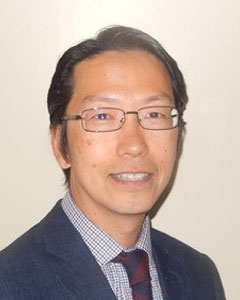
Dr. Noguchi is a professor in the Department of Biochemistry and Molecular Biology at Drexel University College of Medicine. He is the director of the Molecular & Cell Biology & Genetics graduate program. He also directs the Biomedical Graduate Studies Core Curriculum and the Cell Cycle & Apoptosis Course.
How long have you been with the College of Medicine?
Thirteen years.
What research are you currently doing at Drexel?
We have two research tracks. The first is alcohol dependent DNA damage response because alcohol can induce esophageal cancer. The other subject is aging – we are trying to understand how we can extend lifespan.
How did you become interested in researching these topics?
Basically, I am interested in DNA damage response. One example of DNA damage is when you go outside, you are exposed to ultraviolet rays (UV). You might enjoy the sunshine but the UV cuts your DNA. When you drink alcohol, it converts into something very toxic that also cuts your DNA. That is acetaldehyde, which also causes hangovers. I'm interested in how our bodies fix that kind of DNA damage, because if we don't fix it then we might develop cancer. DNA damage is also recognized in the aging process. As you age, your cells accrue more DNA damage. It is important to understand how our bodies repair DNA damage during aging. That is why I am interested in DNA damage response and how to fix the damage.
What excites you most about this research?
First of all, I want to live long, and I like drinking alcohol on occasion! I worry about myself and the people who enjoy drinking, so it's personal. I have two kids, and I was already older when I had them, so I need to live longer, right? My expertise is DNA damage response, so for me it is straightforward to work on the problems of damage-induced cancer and damage-induced aging.
Do you have students who work in your lab?
Yes, we currently have five students. Some are working on alcohol research and some are working on aging. Learn more about Noguchi Lab.
How do you balance your research with teaching?
That's a very important question. In addition to teaching, I have administrative responsibilities because I'm the director of our graduate program. Somehow I just do what I have to do. In the lab, I focus on doing research and writing papers. Then I prepare for my lectures at home.
Did you always want to go into academia and be a teacher?
Yes. My father and my grandfather had similar positions, so it made sense to me.
Do you have any advice for students who are considering doing research in medicine?
You have to enjoy doing research. You need to have passion, otherwise it's easy to get distracted and frustrated. It's important for every scientist to be persistent and consistent. We do research and many things don't work, and then you may get depressed because things didn't work. If you're depressed, your productivity goes down. The most important thing is to just keep going and to have a strong mentality, which is key to success. I think that applies to whatever you do.